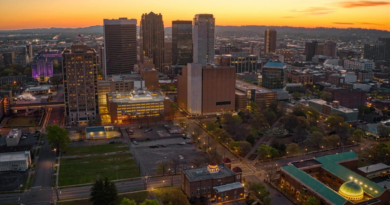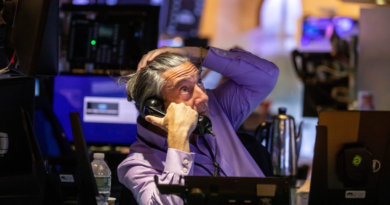Burger King splashes out $1 billion for its largest franchisee in an attempt to ‘Reclaim the Flame’
Burger King’s owner, Restaurant Brands International (RBI), just spent $1 billion to acquire its largest franchisee, Carrols Restaurant Group, in an attempt to speed up its modernization plan. It’s a big gamble from the international fast food giant, but it may be necessary if it hopes to compete with top burger chain McDonald’s, which spent roughly $6 billion to modernize more than 8,700 restaurants beginning in 2018.
“Burger King U.S. has been a laggard in terms of guest experience, and just how modern their franchise locations are relative to their peers,” CFRA research analyst Siye Desta told Fortune. Indeed, Burger King U.S. executives have previously lamented the chain’s lagging customer numbers, admitting to CNN they fell behind competitors during the pandemic and sometimes overcomplicated the ordering experience. In 2020, Burger King dropped behind Wendy’s into third place on the list of America’s best-selling fast-food burger chains and still hasn’t reclaimed its previous second-place standing.
However, the company has seen “some positive signs with their Reclaim the Flame plan,” a bid to modernize its footprint. Those early positive signs may have prompted this acquisition of Carrols to accelerate the plan, Desta said. “They would just like to give Burger King U.S.’s restaurant portfolio more of a modern image, given the amount of remodels their competitors, like McDonald’s, have done already,” he argued.
That’s where Carrols comes in. BK’s largest franchisee has consistently had better foot traffic than its parent company. RBI’s foot traffic was flat for the third quarter of last year (the most recent figures available), while Carrols’ posted rising traffic for its last two quarters. Andrew Charles, an analyst with TD Cowen investment bank, told the Associated Press that Carrols is a superior operator with sales that have historically outperformed Burger King overall.
Buying Carrols’ is a bid to speed up the modernization efforts, which so far have only revamped 40% of Burger King restaurants, with another 10% currently being renovated, according to the AP.
More than half of Carrols’ locations are up for a remodel under the plan. After completing the acquisition in the second quarter of this year, RBI plans to remodel 600 of the franchisee’s 1,022 Burger King locations across 23 states in order to give the restaurants a more “modern image.”
Tom Curtis, president of Burger King U.S. and Canada, called the acquisition “an exciting accelerator” to the modernization plan in a statement. In a twist, the parent company will only hold to the location for a few years. Curtis pledged to remodel Carrols’ restaurants over the next five years “or so” and then refranchise them, putting them “back into the hands of motivated, local franchisees.”
To accomplish this, RBI plans to spend “approximately” $500 million of Carrols’ own operating cash flow on remodels. The company will maintain a portfolio of a couple hundred restaurants after the refranchising process, but only for “strategic innovation, training, and operator development purposes,” it said in a statement.
Reclaiming the flame
Burger King’s Reclaim the Flame modernization plan was launched in September 2022 and initially pledged $400 million for improved advertising, remodels to restaurants, and the implementation of new technologies to boost online sales. CFRA’s Desta said the Carrols acquisition could be a positive long-term driver of earnings and “pay dividends for the brand” if it allows Burger King to more rapidly improve the guest experience to match the competition.
UBS analysts led by Denis Geiger backed up that view in a Wednesday note, arguing that the acquisition will help Burger King “further improve sales growth and store profitability” because the modernized stores will be put in the hands of “well-motivated franchisees.”
The analysts tagged Restaurant Brands International with a buy rating and a $90 price target, implying a potential 18% return over the next 12 months. Burger King U.S. appears “well positioned” in the second year of its turnaround, they said, and is apt to increase traffic and market share. “We believe RBI’s acquisition…reaffirms a commitment & confidence in the [Burger King U.S.] turnaround, while accelerating remodel plans and enabling better growth,” they wrote.
An ‘expensive’ deal
While RBI’s Carrols acquisition will help them accelerate their restaurant modernization, it didn’t come cheap. The $1 billion all-cash deal for Carrols, which also owns 60 Popeyes locations, values the publicly traded franchisee at $9.55 per share, implying a roughly 13% premium to its $8.40 Friday closing price and a 23% premium to its 30 day volume-weighted average price.
Shares of Carrols soared roughly 12% the day after announcement. Deborah Derby, president and CEO of Carrols, which has operated Burger King locations since 1976, said in a statement Tuesday that the acquisition is a testament to the hard work of the 24,000 Carrols’ employees that drove the company to record profits in 2023.
Carrols was hardly underperforming before the acquisition. In the fourth quarter of 2023, comparable restaurant sales at Carrols’ Burger King restaurants rose 7.2% year-over-year. And full-year restaurant sales jumped 8.4% to nearly $1.9 billion compared to $1.73 billion in 2022. The franchisee was also a leader in implementing new restaurant concepts and technologies, like self-order kiosks and Burger King’s new Sizzle restaurant prototype.
Burger King U.S. has yet to report its fourth quarter financial results, but in the third quarter it posted same-store sales growth of just 6.6%, SEC filings show. That’s also compared to U.S. same-store sales of 8.1% in the same quarter for McDonald’s.
Still, Derby argued this was the best deal for Carolls investors because it delivers “immediate and certain value…at an attractive premium to the Company’s current and historical share prices.”
RBI, which also owns Popeye’s, Tim Hortons, and Firehouse Subs brands, had a strong year in 2023 as well, with the stock rising roughly 21% on the back of new store additions and digitization initiatives. But RBI’s stock (ticker: QSR) plunged more than 3% after the Carrols purchase was announced Tuesday.
“It was an expensive acquisition,” CFRA’s Desta said when asked about RBI stock’s poor performance. “But Burger King sees it as a long term investment that should pay off and accelerate the current rate of remodels, which haven’t, I think, met their expectations,” he added.
To Desta’s point, Josh Kobza, who served as RBI’s CFO, CTO, and COO before taking over as CEO in February of 2023, said in a statement that the acquisition is an example of RBI’s willingness to spend money to ”accelerate growth” and create “a more competitive Burger King restaurant base.”
“The strategic merits of this acquisition are very compelling and consistent with our objective to invest our capital in long-term, high-return opportunities,” he said.
Restaurant Brands International did not respond to Fortune’s request for comment on the Carrols acquisition and its strategy.




